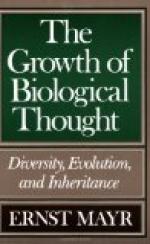The full appreciation of these considerations would tend greatly to establish friendly relations in society; because, first, the good contemplated is such, that the success of one in seeking, facilitates the success of all. Secondly, it would abate the strife for luxuries,—amassing without producing, and cultivating artificial wants,—most fertile sources of discord. And, thirdly, it would establish between physicians and their employers, relations the most agreeable.
Another most unmanageable misconception of life’s good, makes one of its choicest items to be, the possession of power and superiority. To what depths of degradation will man depress his fellows, just to contemplate the distance between his might and their weakness! If this ambition seems less general than the desire of accumulating, or of substituting contrivance for productiveness, it may be, because the necessity of the case more limits the number who can bear rule; otherwise, the passion for power might find as ready an entrance to as many hearts as are taken by the love of gain, or the dislike to labor. We may find in this thought a partial explanation of the fact, that the thrift of the non-slaveholding States contrasted with the stagnation at the South, is so powerless an argument addressed to the slaveholders there; for you have not only to satisfy avarice of the superior profitableness of free labor; you have still to contend with the lust of dominion—the passion for power and superiority. To manage this passion is the heaviest charge of policy—to provide that the offices which must be intrusted to human hands, be filled peaceably and worthily.
Philosophy explodes this notion of good (as claiming to be eminently such), in that it cannot stand the general test: It is a good, which a few must share by detracting so much from the happiness of others.
And further, to the love of power is submitted the consideration, that knowledge is power. It may be feared, this maxim oft suggests scarce other sense, that that deeper insight into the tricks of trade or politics enables the possessor to outwit competitors for riches or honors in the game. It is still a low understanding, that knowledge of nature’s laws multiplies the means of physical enjoyment. Knowledge is power in a higher sense, in that it empowers the possessor to call forth stores of enjoyment form objects, which seem to vulgar apprehension most barren of utility. But knowledge—taken for the round of mental cultivation—is power, in that it is competent to yield to all more than the delightful sense of conscious superiority, which vulgar ambition may afford to a few of its successful votaries; a store, from which each in taking does but multiply the remainder.
But to find it so one must look well, that he apprehend knowledge to be a good of itself, independently of the distinction it confers. For a vain ambition often takes this direction; and then it matters little to one whether himself advance, or others be kept back—since, in either case, the difference between him and them, the distinction chiefly enjoyed, is the same.




